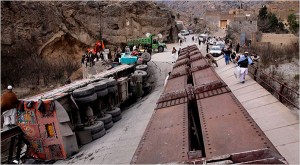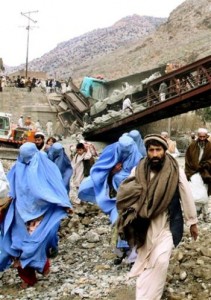Destroyed Khyber Bridge Shuts Down Afghan Logistics Route
BY Herschel SmithContinuing with the strategy The Captain’s Journal outlined approximately one year ago, the Taliban continue to target lines of logistical supply in the Khyber pass region of Pakistan.
Mohammad Sajjad/Associated Press (courtesy of NYT)
Local residents walk past a bridge destroyed by alleged Islamic militants Tuesday, Feb. 3, 2009 in the Pakistani tribal area of Khyber, near Peshawar (AP Photo/Mohammad Sajjad)
Supplies intended for NATO forces in Afghanistan were suspended Tuesday after Taliban militants blew up a highway bridge in the Khyber Pass region, a lawless northwestern tribal area straddling the border with Afghanistan.
Hidayatullah Khan, a government official in the region, was quoted by Reuters as saying that the 30-yard-long iron bridge was located 15 miles northwest of Peshawar, the capital of the restive North-West Frontier Province.
Pakistani officials said they were assessing the damage and teams had been sent to repair the bridge. But it was not immediately clear how soon the trucks carrying crucial supplies for NATO forces would be able to travel through the Khyber Pass to Afghanistan.
Apparently supplies are already moving again. The top U.S. military spokesman in Afghanistan shrugged off any supply worries after Tuesday’s events, saying that traffic was already flowing again in Pakistan after the attack. “They made a bypass,” said Col. Greg Julian.
But amelioration of the temporary interdiction of supplies that occurred due to the bridge doesn’t change the overall strategic problem faced by NATO and the U.S. We have strongly recommended creation of a supply route through the Caspian region, one that would surely be problematic but also one that would avoid the direct empowerment of Russia.
Myra MacDonald cites Stephen Blank, a professor at the U.S. Army War College who reached the conclusion that the United States will have to make concessions to win Russia’s cooperation on Afghanistan. “Russia has the capability to exact a steep price for its cooperation, and it seems fairly certain that the Kremlin will strive to do just that,” he wrote. “One area in which it will likely try to exact that price is in the Caucasus and Black Sea regions, specifically in seeking NATO assurances that Georgia and Ukraine will not be offered membership in the alliance for the foreseeable future, if ever. It is a mark of the strategic malpractice of past U.S. policymakers in Central Asia and Afghanistan that Moscow now finds itself in position to potentially dictate conditions for participation in an endeavor that is clearly in Russia’s best interests.”
Russia knows just how important logistics was to their failed Afghan campaign.
The war was a contest by both sides to control the other’s logistics. The Soviet lines of communication (LOC) were a double lane highway network which wound through the Hindu Kush Mountains – some of the most inhospitable terrain on earth. The Soviet presence depended on its ability to keep the roads open. Much of the Soviet combat in Afghanistan was a fight for control of the road network. The resistance destroyed over 11,000 Soviet trucks. The DRA truck losses were reportedly higher. The Mujahideen ability to interdict the LOC was a constant concern to the Soviet and prevented them from maintaining a larger occupation force in Afghanistan.
It certainly is strategic malpractice, one might even say strategic malfeasance, to have placed us in the position of strengthening Russia in order to prosecute the campaign in Afghanistan. Hard work must be done in order to prevent this exigency. It is for lack of vision that the enemy strategy can be pointed out months before put into place, and yet be ignored by the Pentagon.







No comments yet.
RSS feed for comments on this post. TrackBack URL
Leave a comment